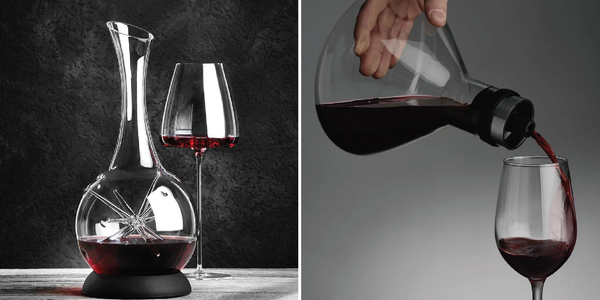
Why You Should Use Decanters for Your Wine: The Benefits for Young Wines
Decanting wine is a practice that dates back centuries, traditionally associated with serving older, sediment-heavy bottles. However, decanting is not just for aged wines—young wines can also benefit significantly from the process. Whether you’re hosting a dinner party or enjoying a quiet evening at home, using a decanter can elevate your wine-drinking experience, particularly with younger wines. Here’s why.
1. Enhances Flavor and Aroma

Young wines, especially those that are bold and tannic, can sometimes taste a bit closed or tight straight out of the bottle. Decanting allows the wine to interact with oxygen, which helps to open up its flavors and aromas. This process, known as aeration, allows the wine’s bouquet to fully develop, revealing the layers of complexity that might not be immediately apparent when first poured.
2. Softens Tannins
Tannins are natural compounds found in grape skins, seeds, and stems, as well as in oak barrels used for aging wine. They give wine structure but can also make young wines taste a bit harsh or astringent. Decanting helps to soften these tannins, making the wine taste smoother and more balanced. This is particularly beneficial for young red wines that might need a bit of time to mellow out.
3. Reduces Harshness
Young wines often have a more pronounced acidity and intensity, which can sometimes be overwhelming. Decanting can help to temper these characteristics, creating a more harmonious and enjoyable drinking experience. By allowing the wine to breathe, you reduce any initial harshness, making the wine more approachable and pleasant on the palate.
4. Removes Sulfite Odors
Many young wines are bottled with sulfites to preserve their freshness and prevent oxidation. While sulfites are generally harmless, they can sometimes impart a slight sulfur smell when the bottle is first opened. Decanting helps to dissipate these odors, leaving the wine’s natural aromas to shine through.
5. Improves Aesthetic Presentation
Beyond the taste benefits, decanting wine also adds an element of elegance to your wine presentation. Pouring wine from a beautifully crafted decanter is not only visually appealing but also enhances the overall experience for you and your guests. It shows that you’re taking the time to care for and appreciate the wine, which can make the occasion feel even more special.
6. Allows for Sediment Separation
While sediment is more commonly associated with older wines, some young wines, especially unfiltered ones, may also contain particles. Decanting helps to separate this sediment from the wine, ensuring a clearer, more enjoyable glass. This is particularly useful for wines that have been minimally processed or are organic.
7. Perfect for Immediate Consumption
Unlike older wines that might need hours of decanting to fully open up, young wines typically benefit from a shorter decanting time—anywhere from 30 minutes to an hour. This makes decanting a practical option for those who want to enjoy their wine without a lengthy wait.

Conclusion
Using a decanter for your wine, especially young wines, can greatly enhance your drinking experience. By allowing the wine to breathe, you can unlock its full potential, softening tannins, reducing harshness, and bringing out richer flavors and aromas. Plus, decanting adds a touch of sophistication to any occasion.
If you’re passionate about wine, investing in a decanter is a small but impactful way to elevate your enjoyment of both young and aged wines. And for optimal wine storage that keeps your bottles in peak condition until you’re ready to decant, explore our range of wine fridges at winefridge.sg.

